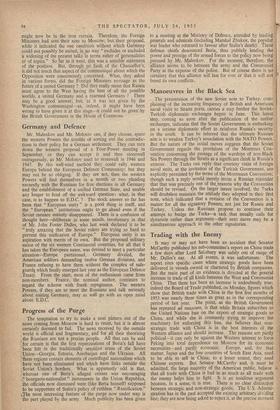Progress of the Purge
The temptation to try to make a neat pattern out of the news coming from Moscow is hard to resist, but it is almost ' certainly doomed to fail. The news received by the outside world is official and fragmentary, and for all their theorising the Russians are not a precise people. All that can be said for certain is that the first repercussions of Beria's fall have been felt in the traditionally sensitive areas of the Soviet Union—Georgia, Estonia, Azerbaijan and the Ukraine. All these regions contain elements of centrifugal nationalism which have not been eliminated and which have links outside the Soviet Union's borders. What is apparently' odd is that, whereas one of Beria's alleged crimes was encouraging ," bourgeois-nationalist " movements in the Union Republics, the officials now dismissed were (like Beria himself) supposed to be supporters of Stalin's policy of ruthless " Russification." i.The most interesting feature of the purge now under way is the part played by the army. Much publicity has been given to a meeting at the Ministry of Defence, attended by leading generals and admirals (including Marshal Zhukov, the popular war leader who returned to favour after Stalin's death). These defence chiefs denounced Beria, thus publicly lending the power and prestige of the armed forces to the policy now being pursued by Mr. Malenkov. For the moment, therefore, the alliance seems to be between the army and the Communist Party at the expense of the police. But of course there is no certainty that this alliance will last for ever or that it will not breed its own conflicts.


























 Previous page
Previous page